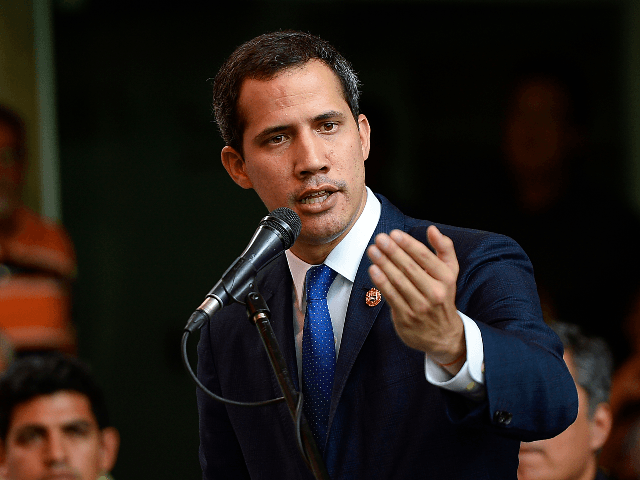Venezuelan President Juan Guaidó urged citizens this weekend to participate in nationwide protests on January 5, the day dictator Nicolás Maduro is set to install a majority loyalist National Assembly to replace the lawmakers who made Guaidó president.
Guaidó is currently the president of the National Assembly, the federal legislature, held by opposition lawmakers since 2015. Most free states consider the 2015 parliamentary elections the last free and fair elections in the country. Lawmakers appointed Guaidó president – which is in their power to do as per the Venezuelan constitution – in January 2019 after Maduro’s last legal term as president expired.
While legally the president of Venezuela, and widely regarded as such internationally, Guaidó has failed to exercise any meaningful power over the country. The Venezuelan military has not at any time recognized him as commander in chief, giving him no power to remove Maduro.
Maduro claims to be president of Venezuela through his victory in the 2018 presidential elections, in which he barred non-socialist candidates from running and used street violence to intimidate voters. Fewer Venezuelans voted in 2018 than in any other election in history, save for the December 2020 parliamentary elections.
Two years into Guaidó’s presidency, Maduro appears more deeply entrenched in power than before. Chavistas, or Maduro loyalist socialists, won 91 percent of National Assembly seats in the December 6 vote, capturing the last government institution they had yet to corrupt.
Guaidó’s supporters organized an event they called a “popular consultation” on Saturday, a parallel election to Maduro’s on December 6. While Maduro’s was an election in which voters chose names on a ballot to represent them in the National Assembly, the “popular consultation” only asked voters three questions regarding the Maduro regime, starting with if they believed the December 6 election was legitimate. Organizers said that 6.4 million Venezuelans participated declaring the event a victory because only about 4 million participated in Maduro’s election. They also denied that they would have to “verify” the votes as no names were on the ballot for any official positions.
Guaidó’s team insisted that the “popular consultation” was the true voice of the people, but have yet to reveal the result, so it is unclear what that voice was saying.
In remarks on Sunday, Guaidó nonetheless proclaimed victory and urged Venezuelans to support him on January 5, when the chavista National Assembly takes over and Guaidó will lose his seat in the parliament – and his legislative immunity.
“Let’s use that energy from yesterday to back our parliament on January 5, we will continue the struggle for democracy,” Guaidó said. Prior to that date, Guaidó vowed that the current Assembly would issue a “formal agreement not to recognize the dictatorship’s parliamentary fraud.”
“The effectiveness or not of the consultation has to do with not submitting to the dictatorship, with not defeating the spirit of Venezuelans,” Guaidó said. “So let’s assume our role in this process and back the national parliament on January 5.”
“We’re going to convene our people on January 5 to back the national parliament,” Guaidó previewed. “We are calling the Venezuelan people to demand their rights, to protest, to manifest themselves … we are a majority.”
Guaidó has lost the power to convene large protests that he once had following his inauguration in January 2019. At the time, Guaidó was a relatively new face in the opposition, untainted by the failures of leaders like socialists Leopoldo López and Henry Ramos Allup, who had supported negotiations with the regime. Guaidó was a member of López’s Popular Will party at the time, however, and gave the then-imprisoned López significant authority in policy towards the regime.
In April 2019, Guaidó appeared in an early-morning live internet feed alongside López, who had fled his house arrest, and declared that the Venezuelan armed forces had abandoned Maduro and that he would now be able to freely govern. Hours later, Maduro refuted that claim alongside his defense minister and senior military officials. While López managed to eventually flee the country, Guaidó’s claim he would be able to control the military did not materialize, and he lost substantial popular support following the stunt.
That loss of leverage resulted in Guaidó openly negotiating with the Maduro regime throughout the rest of 2019. Guaidó denied that the talks were “negotiations,” insisting they were “mediations,” but not distinctly defining his preferred term. The talks, which involved the government of Norway and several other unrelated actors, resulted in no changes in the state of the Venezuelan people. Guaidó announced in August 2020 that Maduro had walked out of the talks, refusing to concede anything.
During those talks, Guaidó also fielded accusations that his officials had engaged in corruption, potentially embezzling humanitarian aid sent from Western states that supported his presidency. Guaidó denied the allegations.
Guaidó’s public image suffered significantly in the aftermath of both the April non-takeover and the unyielding talks with Maduro, which themselves had followed years of unpopular and failed talks between more established opposition figures and the chavistas.
Follow Frances Martel on Facebook and Twitter.

COMMENTS
Please let us know if you're having issues with commenting.